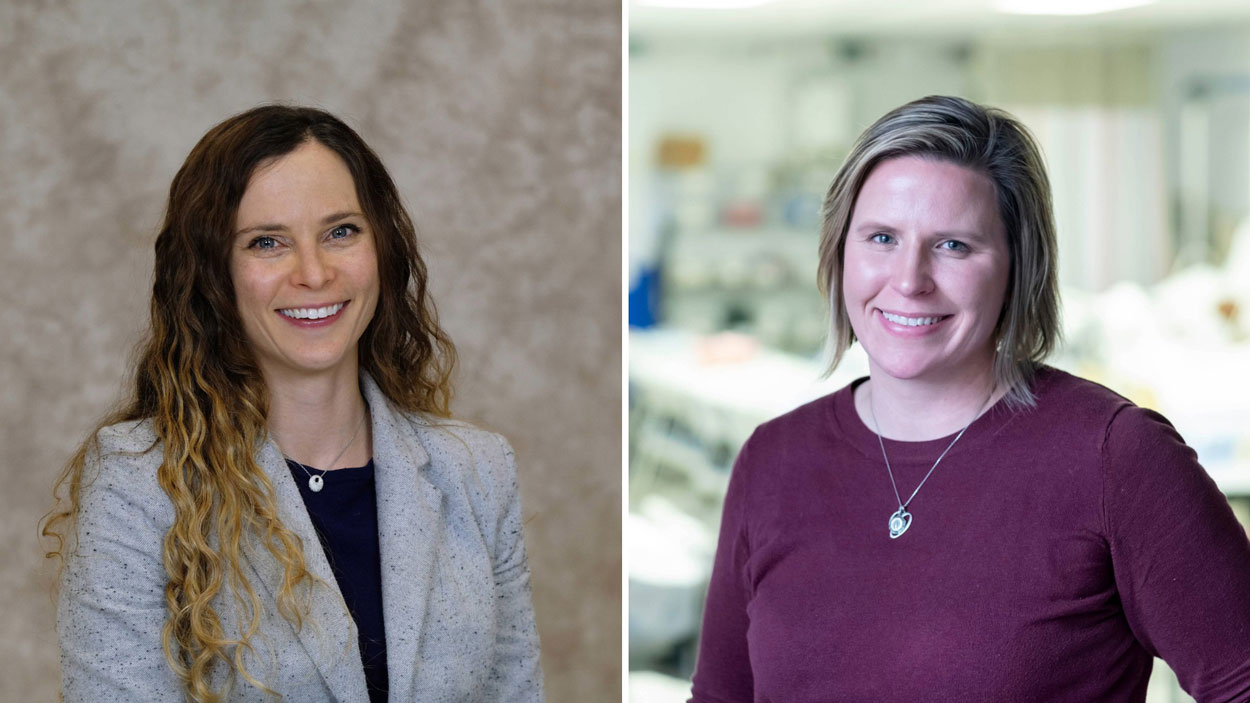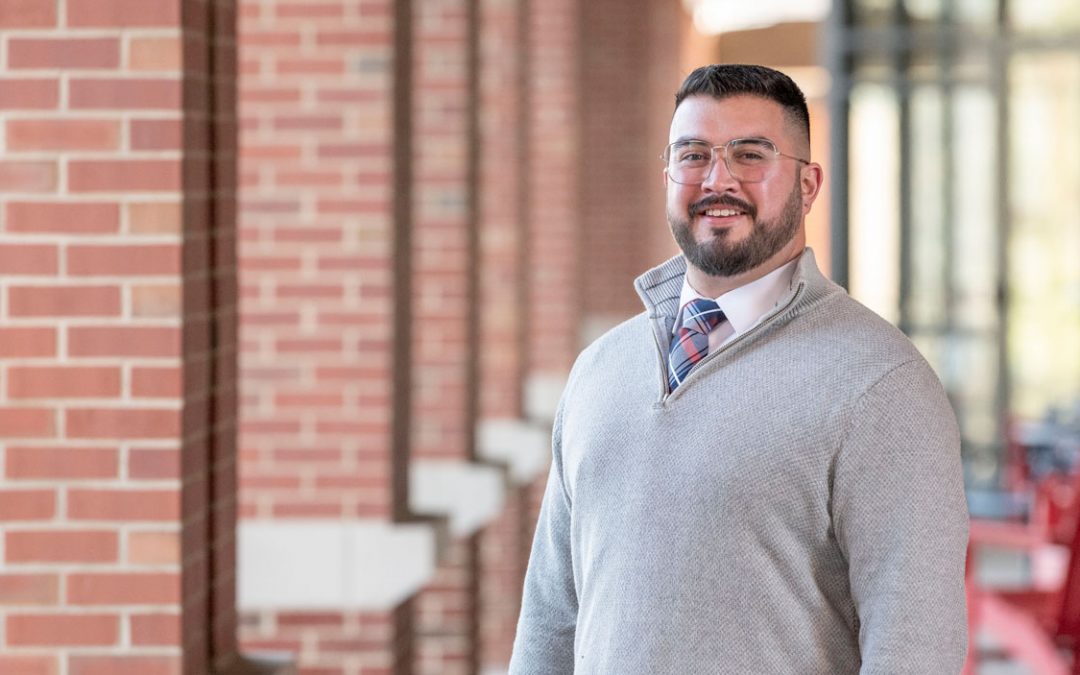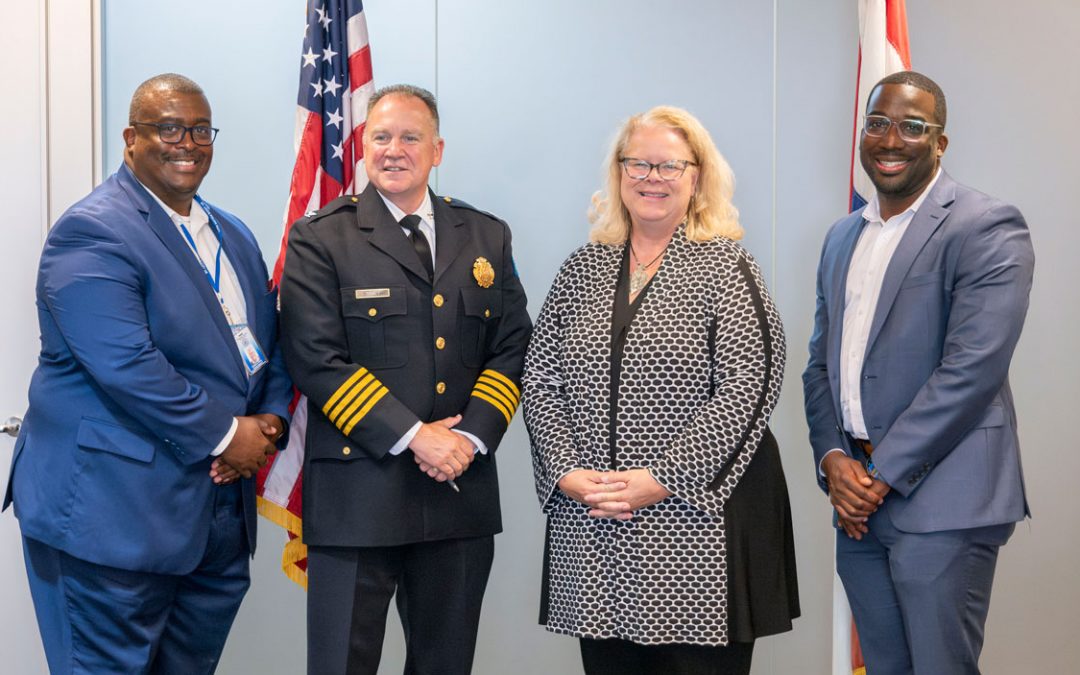
Rachel Wamser is an associate professor in the Department of Psychological Sciences, and Kim Werner is an associate professor and the associate dean of research in the College of Nursing. Both contributed chapters to a new book on cognitive processing therapy. (Photos by August Jennewein)
Since it was first developed by Patricia Resick – at the time a professor of psychology at the University of Missouri–St. Louis – in 1988, cognitive processing therapy has become one of the most common treatments for post-traumatic stress disorder and related conditions. The evidence-based therapy focuses on identifying how traumatic experiences change thoughts and beliefs and how those thoughts influence feelings and behaviors.
Now, nearly 40 years later, two UMSL faculty members are continuing to build on our understanding of how CPT can be used across a wide range of complex patient populations, presentations and treatment settings.
Rachel Wamser, an associate professor in the Department of Psychological Sciences, and Kim Werner, an associate professor and the associate dean of research in the College of Nursing, have each contributed chapters to a new book, “Cognitive Processing Therapy for Complex Cases.” Wamser and Werner are both proud graduates of UMSL’s Department of Psychological Sciences – Wamser earned her PhD in clinical psychology in 2012, while Werner earned her PhD in behavioral neuroscience psychology the following year – and studied under then-Associate Professor Tara E. Galovski, one of the two editors of the book. Werner said the connections she made while working in UMSL’s Center for Trauma Recovery as a student have been critical for fostering such interdisciplinary collaborations.
“Having places like the CTR, where different types of researchers and faculty and clinicians can come together and answer big questions and learn skills from each other and become dynamic scholars, is so essential,” Werner said. “UMSL has a lot of those places where we can do that kind of interdisciplinary research – the Child Advocacy Center, Missouri Institute of Mental Health, the Community Psychological Service. Even me, as a psychologist working in the nursing college, I think that having that interdisciplinary respect and the ability to have places where that is fostered is so important.”
Released in April of this year, “Cognitive Processing Therapy for Complex Cases” aims to provide a comprehensive guide to enhance clinicians’ knowledge and skill in delivering CPT for PTSD and related problems. Each chapter is written by a leading expert in a specific topic area, including case examples with client-therapist dialogue, guidance for implementing CPT in alternative treatment formats and advice for using CPT across different health care settings.
Werner, who wrote her dissertation on sleep disturbance in female trauma survivors and studies psychophysiological responses to trauma, wrote the book’s chapter on “Delivering CPT in the Context of Sleep Disturbance.” The chapter, which looks at ways to integrate sleep interventions into CPT, reviews the existing literature on sleep experiences and PTSD more broadly, as well as theoretical foundations, conceptual models and complementary treatments to CPT. It also builds on her research into “sleep state misperception,” in which individuals report poorer sleep compared to data measured through actigraphy.
Sleep impairments are a common symptom of PTSD, and Werner believes the importance of sleep – including a patient’s ability to interpret the sleep that they’re getting – is essential in moving these clinical therapeutic modalities forward.
“I’m hopeful that this chapter will help clinicians integrate some of these pieces into their ability to help folks with PTSD, whether it be combat veterans or female survivors of domestic violence, or anyone who’s experienced those types of traumatic stress responses,” Werner said.
Wamser, meanwhile, is a licensed clinical psychologist, and her research lab is focused on complex trauma such as intimate partner violence, chronic child maltreatment and gun violence. She’s used CPT in a clinical setting for many years since she was first introduced to it as a graduate student at UMSL, including supervising externships in which students work with individuals at Places for People who are unhoused or on probation.
Along with graduate student Julia Richardson, Wamser co-authored the chapter “Treating Survivors of Sexual Assault with CPT,” which explores how CPT was developed at UMSL and how it’s been effective for treating survivors of sexual assault. In addition to detailing a specific case example Wamser treated several years ago, the chapter also illustrates how flexible CPT is in terms of intervention and how effective it is in challenging victim-blaming and self-blame.
“After a traumatic event, sexual assault survivors can unfortunately experience victim-blaming or comments about, you know, ‘What were they wearing?’ ‘Were they intoxicated?’ ‘Did they go home with someone they shouldn’t have?’” Wamser said. “And so the chapter addresses how to appropriately challenge those social reactions that are not accurate or helpful and the feelings of self-blame that sexual assault survivors can experience, particularly if they perceive negative social reaction.”
Using CPT in such a situation, for instance, Wamser might ask a survivor to imagine what they would say to a friend or family member who was raped or sexually assaulted. Once they role play and have the opportunity to step outside of themselves for a moment, they realize the stark difference in how they’d talk to a loved one versus themselves. Cognitive processing therapy can help them start to address that self-blame and move past those “stuck points.”
“I think it kind of just externalizes it a little bit,” Wamser said. “When you see some of these thoughts on paper and get a little distance from them, it’s like, ‘Whoa. That doesn’t make sense. There’s no way I could have known that the person I went on a date with would sexually assault me.’ If I wouldn’t say that to my daughter, to my mother, to my best friend, why am I saying it to myself?”
Whether in combating negative self-talk or improving sleep quality, CPT has a range of applications for treating trauma survivors. Wamser and Werner both hope that their chapters specifically, and the “Cognitive Processing Therapy for Complex Cases” book as a whole, can serve as a comprehensive resource and practical guide for clinicians, especially when it comes to treating diverse, high-risk populations.
“I hope the book itself guides some of these new clinicians as they’re developing in graduate programs but also serves as a really great tool for successful clinicians to specifically focus on the symptoms that each patient is dealing with,” Werner said. “I’m hoping it validates some of the work that clinicians and counselors are doing for folks who are experiencing traumatic stress and PTSD but also allows them to think about different ways that they may not have approached yet before.”
Wamser also hopes that the book – and its many connections to UMSL – can serve as a reminder of the role that the university has played in developing the predominant evidence-based therapy for treating post-traumatic stress disorder.
“I think it’s nice for the UMSL community to know what a big role we have played in CPT, and that CPT is the leading treatment for PTSD that is used across the VA across the world in treatment for PTSD,” Wamser said. “I went to undergrad and graduate school at UMSL, so to me, it’s a real source of UMSL pride.”














